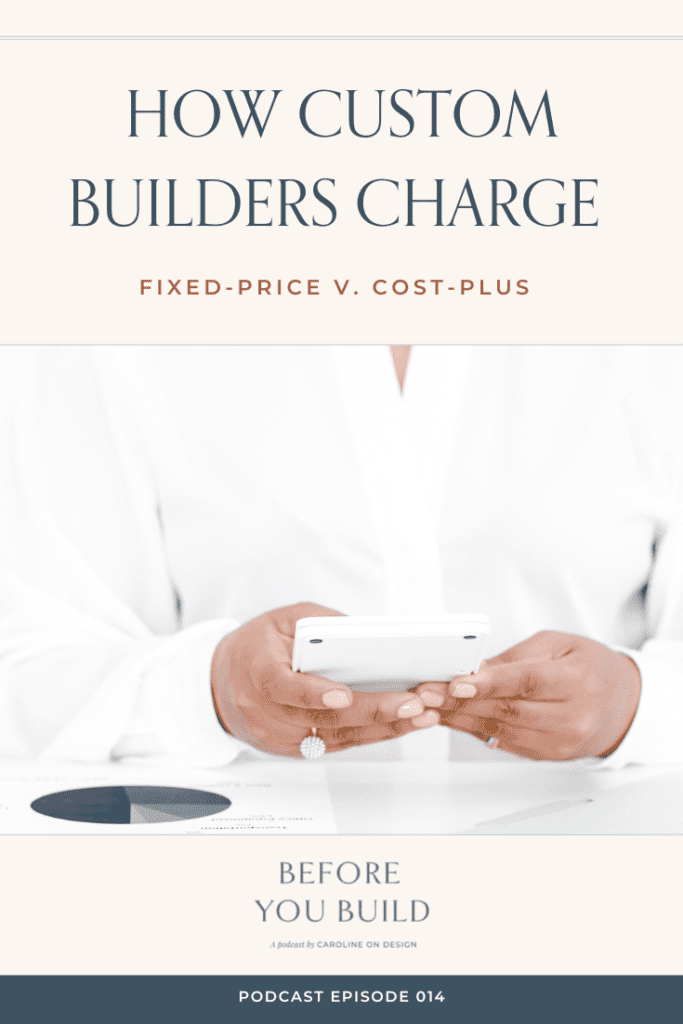Building a custom home is likely one of the most expensive projects (if not THE most expensive project) you’ll take on in your life. So it’s very important that you are familiar with how custom home builders charge so that you don’t have any financial surprises during your build.
Today in episode 14, I’m going to give you an overview of how custom home builders charge their clients. Hopefully, this will help you feel more prepared and ready to discuss the financial side of building with your potential builders.
APPLE | STITCHER | SPOTIFY
I recommend that you have in-depth conversations with potential builders BEFORE you sign a contract so that you are VERY CLEAR about how they will charge you for your home-build project.
The key is for your builder (or potential builders) to be as transparent as possible. They should clearly communicate all of their fee information and bids within your construction contract and this should all be done BEFORE you sign on the (proverbial) dotted line.

HOW CUSTOM BUILDERS CHARGE
Let’s talk about the two common ways that custom home builders charge clients.
We’ll start with the ‘Fixed-Priced’ model because it’s typically what you see when building a home.
However, with the volatility of the market during the pandemic and beyond, more builders have moved to the other pricing model which is called ‘Cost-Plus’.
‘FIXED-PRICE’ CONTRACT
With the ‘Fixed-Price’ option, your builder plans out every detail of your home and gets bids ahead of time, and gives you a ‘final’ cost of your home (including the builder fee).
Of course, you’re responsible for paying for any upgrades, change orders, and allowance overages, BUT your builder is financially responsible for covering mistakes (e.g. subcontractor mistakes or material mistakes) and labor/material price increases during your build.
The ‘Fixed-Price’ model gives your builder an incentive to keep mistakes to a minimum and to complete your home in a timely manner because their profit margin decreases with mistakes and/or with any material/labor price increases during your build.
CONTRACT CLAUSES + SPECS
Some builders do add clauses into the contract (e.g. You have 60 days from the execution of the contract to start construction, or else the builder has the right to re-price the project), so be sure to read the ENTIRE contract … clauses and all!
Also, be sure your builder includes a VERY detailed specification (specs) list in your construction contract so they can’t simply choose the lowest priced materials to save money.
Your builder will take this list of specs to all of the subcontractors to get a bid. It can take some time to collect all the bids before they can provide a final cost for your house.
Typically, you will pay your builder (via your construction loan) in a pre-determined draw schedule (i.e. a detailed payment plan in which you make payments to the contractor as work is completed). Again, this is something you want to be very clear on before you start building.
All right … what are the pros and cons?
FIXED-PRICE PROS
- You know in advance how much your house will cost
- Your builder/contractor will look for the best deals on materials
- Your builder/contractor will move the job along efficiently to save money
- There aren’t any surprises because you are already quoted your final price (provided you don’t go over your allowances or do change orders to upgraded materials)
- Your builder is responsible for paying for any mistakes and material/labor price increases (again, read all clauses in your contract!)
FIXED-PRICE CONS
- Your bid might not be as competitive as a cost-plus bid because your contractor needs to build in a contingency fund for unforeseen events related to the build
- Construction can be delayed because it takes a while to receive all the subcontractor bids
‘COST-PLUS’ CONTRACT
The second option is the ‘Cost-Plus’ contract. As I mentioned before, more and more builders have moved to this payment structure since the market has been so CRAZY since the pandemic started.
When I built my home in 2013, very few builders were using this model, but now it’s pretty common. Pre-pandemic, I would not have recommended that you accept a ‘Cost-Plus’ contract, but now it could be your only option.
With a cost-plus contract, you pay the builder the actual cost of construction PLUS an agreed upon fee to your builder (typically a percentage of the home cost; however, some builders take a fixed fee).
YOU (the homeowner) are responsible for financially covering mistakes and any material/labor price increases during your build. Not only do you pay more for these price increases and/or mistakes, but your builder fee also goes up because it is a percentage of the final cost of the house.
Builders tend to use cost-plus pricing when house costs are harder to predict (e.g. a large custom home or really any custom home, post-pandemic, because there is so much uncertainty).
With this model, your builder will give you a rough estimate of what they *think* it will cost to build your desired home. There is very little data (i.e. bids) collected from subcontractors.
All right … what are the pros and cons?
COST-PLUS PROS
- This can be more competitively priced than a fixed-price home build because the builder takes on less risk
COST-PLUS CONS
- Even with a competitive estimate, your cost can skyrocket if expensive mistakes pop up or there is a rise in material and/or labor costs during your build (which, hello, this has been the norm since Covid started back in 2020)
- There is little incentive for your builder to competitively price materials because the cost is passed on to the homeowner PLUS the builder’s percentage fee goes up if material pricing goes up (because this affects the final cost of the house)
- There is little incentive for your builder to complete your home build in a timely manner because they aren’t paying for the extra cost of loan fees and/or potential material and labor price increases
- Uncertainty with the final price of the completed home
Note: Please contact a local builder, local attorney, and/or local lender for more detailed information. I am simply supplying the base information you need to get started. This is not a substitute for actual legal or financial advice!
NEXT STEPS
In this episode, we talked about the two common ways that custom home builders charge their clients: fixed-price and cost-plus.
Both options have their own pros and cons … however, pre-pandemic, I would have 99% of the time recommended a fixed-price contract because it benefits the client more than a cost-plus contract.
Since 2020 though, you don’t have much of a choice. Your desired builder will let you know how they charge clients.
The bottom line is that you need to choose a builder you feel comfortable with. The most important thing is that your builder is completely transparent and that they clearly communicate all material/labor specs and fee information in your construction contract.
In next week’s episode, we’ll dive deeper into the financial side of building a home and talk allll about construction loans. Not super exciting, but a necessary topic when building :).
Best of luck to you as you get started with your home build. If you want a little guidance on where to start with your home build, go ahead and download my *FREE* Custom Home Build Prep Guide and learn the five steps to prepare you for a home build with less stress, more confidence, and a strategic plan to stick close to budget!

I very rarely comment on posts as you know but this one I have to. I think it all depends on the reputation and quality of the builder you chose. Basically cost plus or fixed cost builder is irrelevant if you have an untrustworthy, unreliable builder who will take the home owner for granted. Either way both have positives and negatives. Do your research on your builder first, ask questions, get to know them personally before you put your trust in them. Get references, look at their work, go to their other build sites. There’s a lot more to the entire thing!
Thank you for your insightful comment, Erin! I agree with everything you said. I have an entire blog post on choosing a (reputable) builder … I will add a link to that blog post within this one.
I like the idea of getting a fixed price for how much your house will cost to be built. My parents want to move to my neighborhood to be close to their grandkids. They can’t find a house so they want to build one, I’ll tell them to get a fixed price first so they know how much it will cost.
Hello! I tried to buy the spend and splurge guide but the form doesn’t work for me. Can I still purchase?
I’m sorry about that, Jessica! I’ll send you an email to get to the bottom of the problem :).
I had no idea that there are two ways on how a design and construction builder charge their service. Since I’m planning to achieve my dream home now that I got my grandpa’s old property, I think it would be best to hire a custom builder to work with me. Perhaps, I shall then opt for one that offers fixed-price service so I don’t have to worry about the surprise costs because they’ve already given me the final price.
Excellent post! Now that it’s halfway through 2024, which pricing method are most custom builders using now? Thanks!
Builder pricing method is still highly dependent on the builder. If you’re planning to build, I would talk to the local builders you’re interested in using and find out what method THEY use. Best!